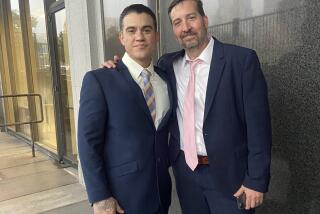Justices reinstate California killer’s death sentence
WASHINGTON — The Supreme Court, reversing the U.S. 9th Circuit Court of Appeals, restored a death sentence Monday for a Central California man who robbed and brutally killed a young woman 25 years ago.
The justices, in a 5-4 decision, concluded that jurors who decided the fate of Fernando Belmontes had weighed all the evidence — good and bad — before condemning him to die for the murder of 19-year old Steacy McConnell in Victor, Calif.
Monday’s decision, the first of this term, was the latest of many over the last decade in which the high court’s conservative majority clashed with the liberal-leaning appeals court based in San Francisco.
In this case, two sides differed over how jurors would have understood the instructions they were given in California death penalty cases in the early 1980s.
Those instructions were changed in 1983 to tell jurors they could consider “any other aspect of the defendant’s character or record” that might call for life in prison, rather than death, for a convicted murderer.
Before that change, jurors were given a long list of factors to consider, including whether the defendant had a mental defect or disturbance, was dominated by another person or was intoxicated at the time of the crime. Finally, jurors were told they could consider “any other circumstance which extenuates the gravity of the crime.” That phrase caused considerable confusion. Some judges said it allowed jurors to consider all factors that call for leniency, such as the defendant’s conversion to Christianity while in prison. Others said it barred jurors from considering evidence that did not involve the crime.
Belmontes had a long criminal record in March 1981 when he went to McConnell’s home, armed with the steel bar of a dumbbell. He clubbed the young woman over the head as many as 20 times, breaking her skull. He emerged from the house covered with blood and carrying her stereo. He and his accomplices later sold it for $100.
Belmontes was arrested and put on trial in San Joaquin County and convicted of burglary and murder. During the sentencing hearing, prosecutors described his violent crimes, including a recent beating of his pregnant girlfriend. A defense lawyer described Belmontes’ impoverished and troubled childhood and his embrace of Christianity while behind bars.
After hearing its instructions, the jury unanimously sentenced Belmontes to die. The California courts upheld his sentence, as did a federal judge in Sacramento.
But when his appeal eventually reached the 9th Circuit in 2003, his death sentence was reversed in a 2-1 ruling.
Judges Stephen Reinhardt and Richard Paez, both of Los Angeles, concluded there was a “reasonable probability” that jurors would have spared Belmontes had they been free to consider evidence of his “future conduct” behind bars. Reinhardt believed the instructions incorrectly told jurors to look back only at the crime and not at evidence that showed Belmontes “would adapt well to prison.”
California Atty. Gen. Bill Lockyer appealed the case to the Supreme Court, which last year overturned Reinhardt’s opinion in a brief order. The high court said the case should be reconsidered in light of its ruling in another case that same year, in which it had reversed the 9th Circuit and restored a death sentence for an Orange County murderer who had become a Christian while incarcerated.
Undaunted, Reinhardt and Paez reaffirmed their original ruling in favor of Belmontes.
Lockyer appealed again to the Supreme Court. This time, the justices heard arguments in the case and Monday issued a 16-page ruling reversing the 9th Circuit.
Justice Anthony M. Kennedy said the appeals courts “erred by adopting a narrow, and we conclude, an unrealistic interpretation” of the jury instructions. Two prison chaplains and Belmontes’ church sponsors testified to his religious conversion at the sentencing hearing, he noted, after which the judge told jurors to weigh “all the evidence.”
Kennedy wrote that it was “improbable” that the jury would hear such testimony and not take it into account.
Chief Justice John G. Roberts Jr. and Justices Antonin Scalia, Clarence Thomas and Samuel A. Alito Jr. joined Kennedy’s opinion in Ayers vs. Belmontes.
The four dissenters said “the natural reading” of the instructions given to the jurors wrongly barred them from considering evidence that did not involve the crime. By this reading, good conduct behind bars could not “extenuate the gravity of the crime” and therefore did not count.
“The incremental value to California of carrying out a death sentence at this late date is far outweighed by the interest in maintaining confidence in the fairness of any proceeding that results in the state’s decision to take the life of one of its citizens,” said Justice John Paul Stevens. Joining him in dissent were Justices David H. Souter, Ruth Bader Ginsburg and Stephen G. Breyer.
A pro-law enforcement group in Sacramento welcomed the ruling. “This well-deserved sentence should have been executed many years ago,” said Kent Scheidegger of the Criminal Justice Legal Foundation. “Claims such as this one, having nothing to do with actual guilt or innocence, should only be reviewed once, not litigated over and over for decades.”
But a lawyer for Belmontes, now 44, said the case is not over yet.
“This is not the end of the road,” said Eric Multhaup, a defense lawyer from Mill Valley, Calif. “This is an unwelcome setback, but there are other issues that the 9th Circuit did not address,” he said, including claims that his trial lawyer was “ineffective.”
*
david.savage@latimes.com
More to Read
Start your day right
Sign up for Essential California for news, features and recommendations from the L.A. Times and beyond in your inbox six days a week.
You may occasionally receive promotional content from the Los Angeles Times.







